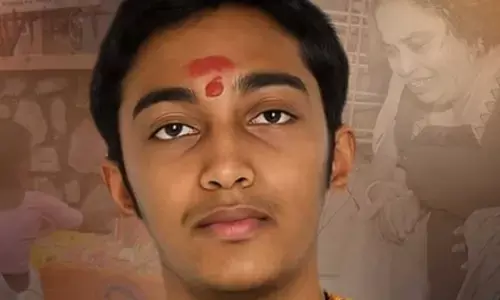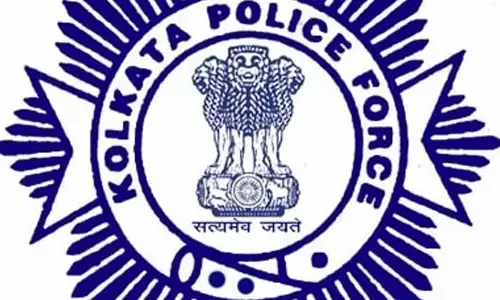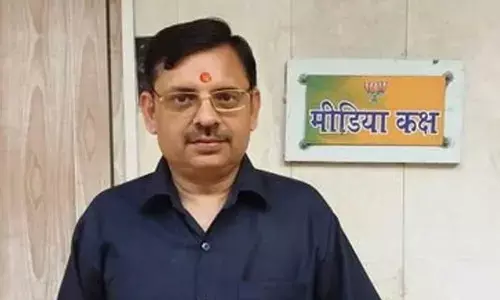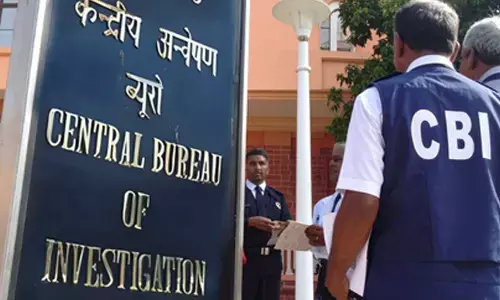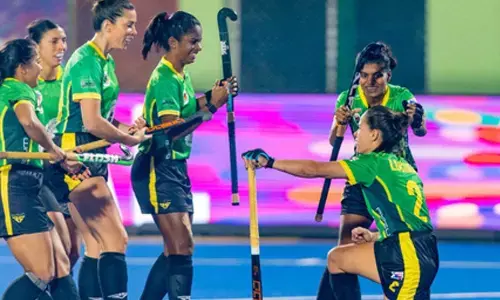Revision everyday, but not before exams

Indian Telugu Civil Service Association, which was set up to guide UPSC aspirants in collaboration with the NGO Prajahitha, conducted a seminar for the aspiring civil servants at Sundarayya Bhavan in Hyderabad. A few civil servants spoke about how they cracked the exam and gave guidance in different aspects of UPSC examination to the students who attended the programme.
Civil servants and top rankers in the Civil Services advised UPSC aspirants who cracked their prelims and would be appearing for their mains on December 1. They threw light on how to approach the exam, what to study and how to stay motivated to crack the exam
Purnima Sriram
Indian Telugu Civil Service Association, which was set up to guide UPSC aspirants in collaboration with the NGO Prajahitha, conducted a seminar for the aspiring civil servants at Sundarayya Bhavan in Hyderabad. A few civil servants spoke about how they cracked the exam and gave guidance in different aspects of UPSC examination to the students who attended the programme.
K Shashanka, All-India 16th rank, gave the students an overview on UPSC examination and advised them to have a planned approach towards the exam. “As General Studies is now for 1,200 marks, one should adopt a sustained and consistent approach to tackle it. They have the examination pattern orientated this time,” he said.
Giving advice on specific subjects, he said, “For Mains, in Economics, learn the fundamentals and also applications with the current affairs. Ensure that you are thorough with introduction and conclusion of all the chapters. Read newspapers, especially editorials and business magazines. Facebook is also of good help if used properly. There are a few pages which gives a lot of information. Use books, pages, magazines strategically. When bored of reading or while having food, listen to Rajya Sabha and Lok Sabha public forums and debates happening on economical conditions and topics related to your subjects where professionals discuss on certain topics which can be of great source of authentic information. Mock tests are of great use. Don’t’ wait till last one month before examination for mock tests. Practice putting things on paper so that you will clear. When you put on paper, you will know where you stand,” he added.
Balalatha, another speaker on the dais who is into Defence Accounting spoke on the paper ‘Ethics, integrity and aptitude’. She advised the students to be practical as government needs practical civil servants. “Intellectual integrity is the most required for an officer. Aspiring civil servants should know everything about bureaucracy, emotional intelligence, mutual bureaucracy, conduct rules. One should know the difference between utilitarianism and utilitarian ethics. Ethics are divided into three parts- Meta ethics, normative ethics, and applied ethics. Ethics is not something that can be taught.
Ethics is in our hearts. Students should write more on politics and ethics by great intellectuals of the world. The case studies, we write should be more specific and beautiful than what a lay man can write. While writing your ethics paper, you should write with your hearty but not with your pen. Concentrate on moral objectivism and moral absolutism too. They will give instances and will ask to write on topics like ‘Mean should justify the end but end should not justify the mean’, ‘a person should be a man of words’. ‘What is legally correct need not always be morally correct, what is morally correct need not always be legally correct’,” she educated.
“Negativity will not work in this field. A person should be optimistic. Cognitive dissonance is an expected question this year. Case studies like RTI act, RTE act, decision on food security act, employment act are expected. Seshan’s sentence, ‘I am suited, booted but nowhere in the civil society’, ‘attitude will decide your aptitude, ‘you show me the man, I will show you the room’ can be asked as a question for case studies,” she threw light.
Dr Suresh from Sunshine Hospital advised the young and aspiring civil servants on how to maintain good health. “Don’t believe any food shown in the advertisement. Instead choose poha over cornflakes. Water intake is a must. Eat at least three fruits a day. Salads should be consumed before every meal. Sufficient amount of protein intake is very important. Eat lots of milk products, dal and curd. Emotions also matter while having food. The energy of a boiled egg is 70 calories universally. When I give an egg to a boy who is happy will absorb 70 cal whereas a boy who is depressed absorbs only 30 kal when he consumes it,” he added.
Ramesh Reddy, who scored 54th rank in 2007 and who into National Investigative agency, said, “Read your syllabus paper again and again. Focus on disaster management studies. Know the definitions of every point. For example- definition of terrorism and also about who framed it. Definition of terrorism defers from place to place. For Pakistanis, it’s different, for us it’s different. Learn about the institutional frame works, like what is NIA – when was it formed? What does it do? Why was it formed? Same way there can be many questions asked on what is National disaster management agency.
While writing in the examination, underline important points and also have a few graphical representations which can attract the evaluator’s eyes. Spend 30% of your day on revision,” he advised. Nikhil from Railway Service advised the students to read Rajesh Paruchuri’s articles. “His articles are crispy and informative. Don’t read too many books and newspapers and confuse yourself.








